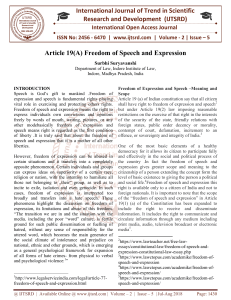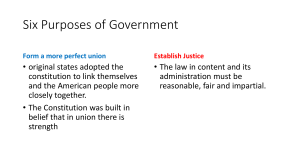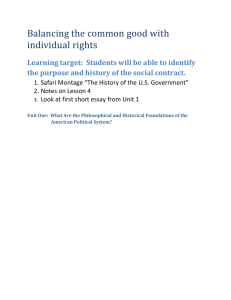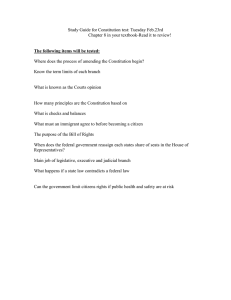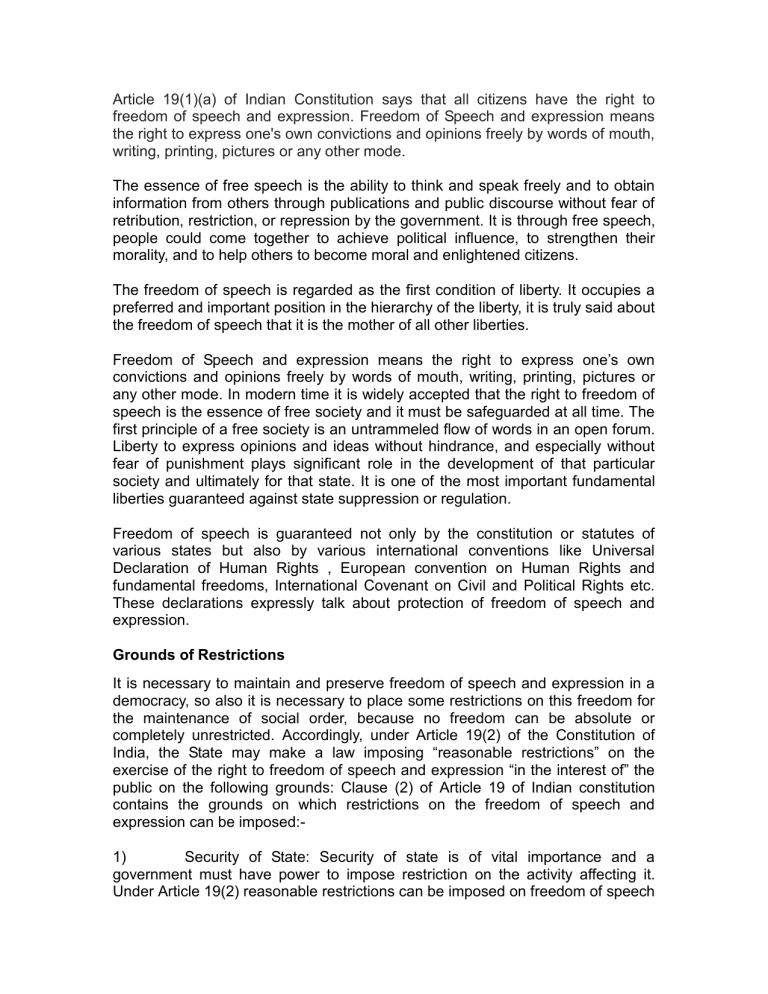
Article 19(1)(a) of Indian Constitution says that all citizens have the right to freedom of speech and expression. Freedom of Speech and expression means the right to express one's own convictions and opinions freely by words of mouth, writing, printing, pictures or any other mode. The essence of free speech is the ability to think and speak freely and to obtain information from others through publications and public discourse without fear of retribution, restriction, or repression by the government. It is through free speech, people could come together to achieve political influence, to strengthen their morality, and to help others to become moral and enlightened citizens. The freedom of speech is regarded as the first condition of liberty. It occupies a preferred and important position in the hierarchy of the liberty, it is truly said about the freedom of speech that it is the mother of all other liberties. Freedom of Speech and expression means the right to express one’s own convictions and opinions freely by words of mouth, writing, printing, pictures or any other mode. In modern time it is widely accepted that the right to freedom of speech is the essence of free society and it must be safeguarded at all time. The first principle of a free society is an untrammeled flow of words in an open forum. Liberty to express opinions and ideas without hindrance, and especially without fear of punishment plays significant role in the development of that particular society and ultimately for that state. It is one of the most important fundamental liberties guaranteed against state suppression or regulation. Freedom of speech is guaranteed not only by the constitution or statutes of various states but also by various international conventions like Universal Declaration of Human Rights , European convention on Human Rights and fundamental freedoms, International Covenant on Civil and Political Rights etc. These declarations expressly talk about protection of freedom of speech and expression. Grounds of Restrictions It is necessary to maintain and preserve freedom of speech and expression in a democracy, so also it is necessary to place some restrictions on this freedom for the maintenance of social order, because no freedom can be absolute or completely unrestricted. Accordingly, under Article 19(2) of the Constitution of India, the State may make a law imposing “reasonable restrictions” on the exercise of the right to freedom of speech and expression “in the interest of” the public on the following grounds: Clause (2) of Article 19 of Indian constitution contains the grounds on which restrictions on the freedom of speech and expression can be imposed:1) Security of State: Security of state is of vital importance and a government must have power to impose restriction on the activity affecting it. Under Article 19(2) reasonable restrictions can be imposed on freedom of speech and expression in the interest of security of State. However the term “security” is very crucial one. The term “security of state” refers only to serious and aggravated forms of public order e.g. rebellion, waging war against the State, insurrection and not ordinary breaches of public order and public safety, e.g. unlawful assembly, riot, affray. Thus speeches or expression on the part of an individual, which incite to or encourage the commission of violent crimes, such as, murder are matters, which would undermine the security of State. 2) Friendly relations with foreign states: In the present global world, a country has to maintain good and friendly relationship with other countries. Something which has potential to affect such relation ship should be checked by government. Keeping this thing in mind, this ground was added by the constitution (First Amendment) Act, 1951. The object behind the provision is to prohibit unrestrained malicious propaganda against a foreign friendly state, which may jeopardize the maintenance of good relations between India, and that state. 3) No similar provision is present in any other Constitution of the world. In India, the Foreign Relations Act, (XII of 1932) provides punishment for libel by Indian citizens against foreign dignitaries. Interest of friendly relations with foreign States, would not justify the suppression of fair criticism of foreign policy of the Government. However it is interesting to note that member of the commonwealth including Pakistan is not a “foreign state” for the purposes of this Constitution. The result is that freedom of speech and expression cannot be restricted on the ground that the matter is adverse to Pakistan. 4) Public Order: Next restriction prescribed by constitution is to maintain public order. This ground was added by the Constitution (First Amendment) Act. ‘Public order’ is an expression of wide connotation and signifies “that state of tranquility which prevails among the members of political society as a result of internal regulations enforced by the Government which they have established.” Here it is pertinent to look into meaning of the word “Public order. Public order is something more than ordinary maintenance of law and order. ‘Public order’ is synonymous with public peace, safety and tranquility. Anything that disturbs public tranquility or public peace disturbs public order. Thus communal disturbances and strikes promoted with the sole object of accusing unrest among workmen are offences against public order. Public order thus implies absence of violence and an orderly state of affairs in which citizens can peacefully pursue their normal avocation of life. Public order also includes public safety. Thus creating internal disorder or rebellion would affect public order and public safety. But mere criticism of government does not necessarily disturb public order. The words ‘in the interest of public order’ includes not only such utterances as are directly intended to lead to disorder but also those that have the tendency to lead to disorder. Thus a law punishing utterances made with the deliberate intention to hurt the religious feelings of any class of persons is valid because it imposes a restriction on the right of free speech in the interest of public order since such speech or writing has the tendency to create public disorder even if in some case those activities may not actually lead to a breach of peace. But there must be reasonable and proper nexus or relationship between the restrictions and the achievements of public order. 5) Decency or morality: The way to express something or to say something should be decent one. It should not affect the morality of the society adversely. Our constitution has taken care of this view and inserted decency and morality as a ground. The words ‘morality or decency’ are words of wide meaning. Sections 292 to 294 of the Indian Penal Code provide instances of restrictions on the freedom of speech and expression in the interest of decency or morality. These sections prohibit the sale or distribution or exhibition of obscene words, etc. in public places. No fix standard is laid down till now as to what is moral and indecent. The standard of morality varies from time to time and from place to place. 6) Contempt of Court: In a democratic country Judiciary plays very important role. In such situation it becomes essential to respect such institution and its order. Thus, restriction on the freedom of speech and expression can be imposed if it exceeds the reasonable and fair limit and amounts to contempt of court. According to the Section 2 ‘Contempt of court’ may be either ‘civil contempt’ or ‘criminal contempt.’ But now, Indian contempt law was amended in 2006 to make “truth” a defence. However, even after such amendment a person can be punished for the statement unless they were made in public interest. Again in Indirect Tax Practitioners Assn. vs R.K.Jain, it was held by court that, “Truth based on the facts should be allowed as a valid defence if courts are asked to decide contempt proceedings relating to contempt proceeding relating to a speech or an editorial or article”. The qualification is that such defence should not cover-up to escape from the consequences of a deliberate effort to scandalize the court. 7) Defamation: Ones’ freedom, be it of any type, must not affect the reputation or status another person. A person is known by his reputation more than his wealth or any thing else. Constitution considers it as ground to put restriction on freedom of speech. Basically, a statement, which injures a man’s reputation, amounts to defamation. Defamation consists in exposing a man to hatred, ridicule, or contempt. The civil law in relating to defamation is still uncodified in India and subject to certain exceptions. 8) Incitement to an offence: This ground was also added by the constitution (First Amendment) Act, 1951. Obviously, freedom of speech and expression cannot confer a right to incite people to commit offence. The word ‘offence’ is defined as any act or omission made punishable by law for the time being in force. 9) Sovereignty and integrity of India- To maintain sovereignty and integrity of a state is prime duty of government. Taking into it into account, freedom of speech and expression can be restricted so as not to permit any one to challenge sovereignty or to permit any one to preach something which will result in threat to integrity of the country. From above analysis, it is evident that Grounds contained in Article 19(2) show that they are all concerned with the national interest or in the interest of the society. The first set of grounds i.e. the sovereignty and integrity of India, the security of the State, friendly relations with foreign States and public order are all grounds referable to national interest, whereas, the second set of grounds i.e. decency, morality, contempt of court, defamation and incitement to an offence are all concerned with the interest of the society. Conclusion Expression through speech is one of the basic guarantees provided by civil society. However in modern world Right to freedom of speech and expression is not limited to express ones’ view through words but it also includes circulating one’s views in writing or through audiovisual instrumentalities, through advertisements and through any other communication channel. It also comprises of right to information, freedom of press etc. It is a right to express and self realization. Two big democracies of world i.e. America and India have remarkably protected this right. As far as India is concerned, this important right is mentioned in Article 19(1) (a), which falls in fundamental right category. Indian courts have always placed a broad interpretation on the value and content of Article 19(1) (a), making it subjective only to the restrictions permissible under Article 19(2). The words ‘in the interest of public order’, as used in the Article 19 include not only utterances as are directly intended to lead to disorder but also those that have the tendency to lead to disorder. There should be reasonable and proper nexus or relationship between the restriction and achievement of public order. Freedom of speech and expression is the bulwark of democratic government. This freedom is essential for the proper functioning of democratic process and is regarded as the first condition of liberty. It occupies a preferred position in the hierarchy of liberties giving protection to all other liberties. It has been truly said that it is the mother of all other liberties. That liberty include the right to acquire information and disseminate the same. It includes the right to communicate it through available media without interference to as large a population of the country, as well as abroad, as is possible to reach. Right to know is the basis right of the citizens of a free country and Art. 19(1)(a) protects that right. Right to receive information springs from Art 19(1)(a).

